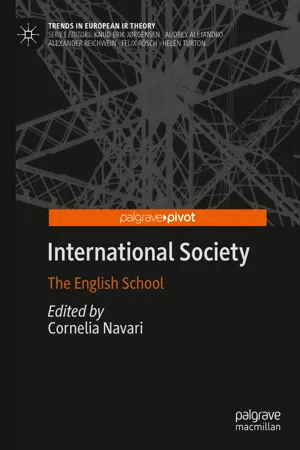
- English
- ePUB (mobile friendly)
- Available on iOS & Android
About This Book
This book provides an introduction to, and analysis of, the English School's views on International Relations as they developed from the somewhat vague state/society distinction to the present focus on foundation institutions, regional organisation and the globalization of international society. It focuses on key thinkers and texts and turning points and moves our understanding of the English School beyond the past work of the British Committee to the more recent work of Barry Buzan et. al. to offer a comprehensive overview and interrogation from the leading lights of this arm of International Relations thought. This volume is one of the cornerstones of the EISA sponsored Trends in European IR Theory series complementing the volumes on International Political Theory, Liberalism, Realism, International Political Economy, the post-positivist tradition, and Feminism published for the centenary of IR as a discipline.
Frequently asked questions
Information
- Aalberts, Tanja. 2010. Playing the Game of Sovereign States: Charles Manning’s Constructivism avant-la-lettre. European Journal of International Relations 16 (2): 247–268.
- Aalto, Pami. 2007. Russia’s Quest for International Society and the Prospects for Regional-Level International Societies. International Relations 21 (4): 459–478.
- Acharya, Amitav. 2014. The End of American World Order. Cambridge: Polity Press.
- Adler, Emanuel. 2005. Barry Buzan’s Use of Constructivism to Reconstruct the English School: ‘Not All the Way Down’. Millennium: Journal of International Studies 34 (1): 171–182.
- ———. 2019. World Ordering. A Social Theory of Cognitive Evolution. Cambridge: Cambridge University Press.
- Adler, Emanuel, and Vincent Pouliot. 2011. International Practices. International Theory 3 (10): 1–36.
- Ahrens, Bettina. 2017. The Solidarisation of International Society: The EU in the Global Climate Change Regime. GLOBUS Research Paper 5/2017. http://www.globus.uio.no/publications/globus-research-papers/
- ———. 2019. The European Union Between Solidarist Change and Pluralist Re-Enactment. In International Organization in the Anarchical Society, ed. Tonny Brems Knudsen and Cornelia Navari, 265–292. Basingstoke: Palgrave Macmillan.
- Ahrens, Bettina, and Thomas Diez. 2015. Solidarisation and Its Limits: The EU and the Transformation of International Society. Global Discourse 5 (3): 341–355.
- Alderson, Kai, and Andrew Hurrell, eds. 2001. Hedley Bull on International Society. Basingstoke: Macmillan.
- Alexandrowicz, C.H. 1973. The European-African Confrontation. Leiden: A.W. Sijthoff.
- Anievas, Alexander, Nivi Manchanda, and Robbie Shilliam, eds. 2015. Race and Racism in International Relations: Confronting the Global Colour Line. Abingdon: Routledge.
- Armitage, David. 2012. Foundations of Modern International Thought. Cambridge: Cambridge University Press.
- Ayoob, Mohammed. 1983/4. Security in the Third World. International Affairs 60 (1): 41–51.
- ———, ed. 1986. Regional Security in the Third World. London: Groom Helm.
- ———. 1989. The Third World in the System of States. International Studies Quarterly 33 (1): 67–79.
- ———. 1995. The Third World Security Predicament. Boulder: Lynne Rienner.
- ———. 1999. From Regional System to Regional Society: Exploring Key Variables in the Construction of Regional Order. Australian Journal of International Affairs 53 (3): 247–260.
- Ayson, Robert. 2012. Hedley Bull and the Accommodation of Power. Basingstoke: Palgrave Macmillan.
- Bain, William. 2003. Between Anarchy and Society: Trusteeship and the Obligations of Power. Oxford: Oxford University Press.
- ———. 2007. One Order, Two Laws: Recovering the ‘Normative’ in English School Theory. Review of International Studies 33: 557–575.
- ———. 2014. Rival Traditions of Natural Law: Martin Wight and the Theory of International Society. International History Review 36 (5): 943–960.
- Banks, Michael. 1973. Charles Manning, the Concept of ‘Order’, and Contemporary International Theory. In The Bases of International Order, ed. Alan James, 188–209. London: Oxford University Press.
- Bartelson, Jens. 1995. A Genealogy of Sovereignty. Cambridge: Cambridge University Press.
- Bayly, C.A. 2004. The Birth of the Modern World, 1780–1914. Oxford: Blackwell.
- Behr, Hartmut. 2007. The European Union in the Legacies of Imperial Rule? European Journal of International Relations 13 (2): 239–262.
- ———. 2011. Europe—History, Violence and “Peripheries”. Review of European Studies 4 (3): 7–17.
- Bell, Duncan. 2001. International Relations: The Dawn of a Historiographical Turn? British Journal of Politics and International Relations 3 (1): 115–126.
- Bellamy, Alex, ed. 2005. International Society and Its Critics. Oxford: Oxford University Press.
- Bellamy, Alex J., and Matt McDonald. 2004. Securing International Society: Towards an English school Discourse of Security. Australian Journal of Political Science 39 (2): 307–330.
- Bentley, J. 1993. Old World Encounters: Cross-Cultural Contacts and Exchanges in Pre-Modern Times. Oxford: Oxford University Press.
- Berenskoetter, Felix. 2017. Approaches to Concept Analysis. Millennium 45 (2): 151–173.
- Bevir, Mark, and Ryan Phillips. 2017. Genealogies of European Governance. Comparative European Politics 15: 685–704.
- Bially Mattern, Janice. 2001. The Power Politics of Identity. European Journal of International Relations 7 (3): 349–393.
- Bially Mattern, Janice, and Ayse Zarakol. 2016. Hierarchies in World Politics. International Organization 70 (3): 623–654.
- Biscop, Sven. 2016. All or Nothing? The EU Global Strategy and Defence Policy After the Brexit. Contemporary Security Policy 37 (3): 431–445.
- Blanchard, Eric M. 2011. Why Is There No Gender in the English School? Review of International Studies 37 (2): 855–879.
- Börzel, T.A., and Thomas Risse, eds. 2016. The Oxford Handbook of Comparative Regionalism. Oxford: Oxford University Press.
- Bowden, Brett, and Leonard Seabrooke, eds. 2006. Global Standards of Market Civ...
Table of contents
- Cover
- Front Matter
- The Development of English School Theory: An Introduction
- Sovereignty, Law, and International Society: The Contribution of C. A. W. Manning
- Hedley Bull and the Idea of Order in International Society
- The Expansion of International Society
- Becoming a School: The Institutional Debate of the 1980s
- ‘Reconvening’ the English School
- Pluralism and Solidarism
- Regionalism
- Institutions and Organizations
- Using the English School to Understand Current Issues in World Politics
- Back Matter